| Have you ever wanted to watch a person with the ears, tail and mindset of a cat get interviewed? Whether this is something you've always wanted to see, or it's a weird but tantalizing concept that you never knew you needed until now, you can see Nyla's interview on The Protagonist Speaks by clicking the button below. |
|
0 Comments
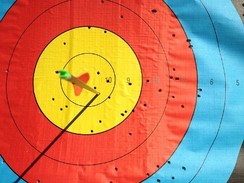 If you don't have natural talent as a writer, should you keep on trying or give up? In today's blog post, Ryan Lanz shares his thoughts: Guest post by Ryan Lanz
What if you don’t have natural talent? Does that mean you may as well give up? It’s not quite the chicken or the egg debate, but it’s up there. I’ve heard people go in circles about which comes first and which is necessary. At what combination of both does one continue the grind and attempt at success? I’d be surprised if you haven’t asked yourself that question. It’s a part of being human. What does each really mean? This comes from the university of my opinion, but I would describe talent as the natural ability that needs little to no refinement, and skill is the unnatural ability that you have to develop. For those of us who’ve played sports (myself excluded), I’m sure you’ve all encountered someone who strides onto the field and makes it all look so darn effortless. This person hardly shows up to practice, and you have a fairly good idea that it took hardly any effort to accomplish. Same with the person who aced every test in college with little preparation, leaving you in study hall time after time with a bucket of coffee. You must have missed at least three parties because you had to cram for the Calculus exam, right? Which is better? Good question. And one not so easily answered. Sure, we would all like natural talent that we don’t have to pour so much effort into, but sometimes that doesn’t quite pan out. Often, we are born with enough talent to have an affinity for a profession, but the rest has to be made up with skill. In writing, there are dozens of abilities that need to be present to make a good novel, such as foreshadowing, prose, description, natural dialogue, pacing, etc. Let’s say that you have a knack for writing dialogue, but your setting description rambles on and on. The squeaky wheel gets the oil, and you’ll have to practice at writing setting description over time to develop it into a skill, even if it’s not a natural talent. To be fair, natural talent does get you to the goal quicker. Related: Finishing a Book is a Skill The combination of the two
If Tiger Woods is not the best golf player of all time, then he comes very close. He started golfing on professional courses at the age of two years old and was featured in a golf magazine at the age of five. Tiger spent 545 weeks combined total as the world number one. In my opinion, that is some superb natural talent. Although Tiger has mounds of it, he still had a golfing coach (and probably still does) through most of his career. That’s combining the natural with the refined skill that creates that sweet spot. Think about how you can make a similar combination. Is it so bad if you don’t have natural talent? Should you give up? The one downside to having natural talent is that you don’t have as much appreciation for the effort. Let’s look at two writers: one who writes his/her first book and quickly becomes published, and the other is a writer who labors for ten years to even become noticed. Both eventually become published and successful, let’s say. I think it’s fair to say that the latter writer has more appreciation for the effort of the craft. There are small nuances of writing that I feel are best represented when someone has to massage and mold their skill over the long-term. I believe that about anyone can accomplish about anything if they were to dedicate their entire life to it, even if that person doesn’t have a drop of natural talent. Ask yourself what craft you can master if you were to invest 20 years in its perfection. So, no, don’t simply give up on it. You may have been born with talent in a profession you’re not interested in. That’s okay, just work to catch up in a profession that you are. Conclusion If you sharpen your skill enough, people will believe that you’ve had talent from the very beginning, regardless of how much you actually had to start with. Original post here. Guest post contributed by Ryan Lanz. Ryan is an avid blogger and author of The Idea Factory: 1,000 Story Ideas and Writing Prompts to Find Your Next Bestseller. You can also find him on Twitter, Facebook, and Tumblr.  Guest post by Ryan Lanz. Writers use dialogue tags constantly. In fact, we use them so often that readers all but gloss over them. They should be invisible. However, there are ways to misuse them and make them stand out. In an effort to avoid that, let’s take a closer look at dialogue tags. Toward the end of “Tag travesties” is something I sorely wish someone had told me before I started writing. Why do we use dialogue tags? The simple answer is that we use them to indicate who’s speaking. In visual media, such as movies or television, the viewer can easily tell who’s talking by lip movement and camera angles. When reading a book, obviously that’s not an option. Tag travesties There are certainly ways to misuse dialogue tags. When I was a new writer, I felt compelled to overwrite. I ‘m sure every new writer goes through a version of this. I observed how successful writers used simple tags like “said/asked” and thought to myself, that’s boring. I’m going to be an awesome writer by making them more interesting. You don’t have to admit it aloud, writers, but we all know that most of us have. Let’s look at an example of this:
For those of you who still aren’t convinced, let’s up the dosage with a paragraph: Hank crossed the room and sat down. “We should have never waited this long for a table,” he seethed, leaning over to glare at her. “If you wanted a better spot, you should have called ahead for a reservation,” Trudy returned pointedly. “Well, perhaps if you didn’t take so long to get ready, I could have,” he countered dryly. Can you imagine reading an entire book like that? *shiver* So why do new writers feel the urge to be that . . . creative with their dialogue tags? Back in the beginning, I thought the typical tags of “said/asked” were too boring and dull. It didn’t take me long to realize that dull (in this context) is the point. Image your words as a window pane of glass, and the story is behind it. Your words are merely the lens that your story is seen through. The thicker the words, the cloudier the glass gets. If you use huge words, purple prose, or crazy dialogue tags, then all you’re doing is fogging up the glass through which your reader is trying to view your story. The goal is to draw as little attention to your actual words as possible; therefore, you keep the glass as clear as possible, so that the reader focuses on the story. Using tags like “said/asked” are so clear, they’re virtually invisible. Now, does that mean that you can’t use anything else? Of course not. Let’s look further. Alternate dialogue tags Some authors say to never use anything other than “said/asked,” while others say to heck with the rules and use whatever you want. Some genres (such as romance) are more forgiving about using alternate dialogue tags. I take a more pragmatic approach to it. I sometimes use lines like: “I’m glad we got out of there,” she breathed. The very important question is how often. I compare adverbs and alternate dialogue tags to a strong spice. Some is nice, but too much will spoil the batch. Imagine a cake mix with a liter of vanilla flavoring, rather than the normal tablespoon. The more often you use anything other than “said/asked,” the stronger the flavor. If it’s too powerful, it’ll tug the reader away from the story and spotlights those words. In a full length book of around 85,000 words, I personally use alternate dialogue tags only around a few dozen times total. By saving them, the pleasant side effect is that when I do use them, they pack more of an emotional punch. Related: How to Write Natural Dialogue Action beats I have a love affair with action beats. Used effectively, they can be another great way to announce who’s talking, yet at the same time add some movement or blocking to a scene. For example: Looking down, Katie ran a finger around the edge of the mug. “We need to talk.” That added some nice flavor to the scene, and you know who spoke. The only caveat is to be careful of not using too many action beats, as it does slow down the pacing a tiny bit. If you’re writing a bantering sequence, for example, you wouldn’t want to use a lot of action beats so as to keep the pacing quick. Dos and don’ts Sometimes, action beats and dialogue tags have misused punctuation. I’ll give some examples.
Conclusion Like many things in a story/novel, it’s all about balance. Try alternating actions beats, dialogue tags, and even no tags at all when it’s clear who’s speaking. By changing it up, it’ll make it so that no one method is obvious. About the author: Ryan Lanz is an avid blogger and author of The Idea Factory: 1,000 Story Ideas and Writing Prompts to Find Your Next Bestseller. You can also find him on Twitter, Facebook, and Tumblr. Image courtesy of Onnola via Flickr, Creative Commons.  One area that often trips writers up is describing the places and scenery around their characters. Some stories paint a sparse, vague picture that doesn't draw the readers in, while others plunge into story-stopping walls of intricate detail. So how do you describe the place your characters occupy in a way that paints a vivid picture and awakens your readers’ emotions, without bogging down the story with too much description? Today, Mica Scotti Kole will give you 5 useful tips for describing the settings in your books. Click the button below to check them out:  One of the most challenging - yet necessary - parts of being an artist is the ability to handle criticism. Some critics are harsh, some are gentle; some have valid points, while others just enjoy shooting pellets of unhelpful negativity randomly into the web. Whatever form they take, they’re out there, and if you put yourself out there in any way you’re sure to run into them sooner or later. Thankfully, Patreon writer Dave Hunt recently shared some great tips for how to respond to your haters, and how to handle your own reaction to their barbs. Click the button below to check out the article: By the way, if you aren’t familiar with Patreon, it’s a site that enables fans to get extra content, advanced viewings of new creations and works in progress, and other goodies in exchange for supporting their favorite creators.
I recently created an account there myself, so if you enjoy my writing, art, music and videos and you want more, please take a minute to check it out and see what cool rewards you can get! 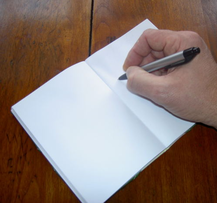 Some people have no desire to write a book - and that's perfectly fine. But when people WANT to put their story or knowledge into writing, they often run into a certain set of obstacles that can stop you in your tracks if you let it. Maria Murnane, best-selling author of the Waverly Bryson series, Cassidy Lane, Katwalk, and Wait for the Rain, recently wrote an article explaining why many would-be authors don't complete their books. She also offered a mindset shift to help you get past those obstacles, so you can finally complete the literary masterpiece that's hidden in your head. So if you have a book that's trapped inside you, or you're curious about why some authors don't complete their books, click the button below to check out her article. 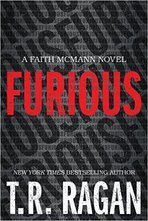 I recently read an interesting article about bestselling author Theresa Ragan. After hundreds of rejection notices, she made it big... and part of that was due to the way she channeled her frustration and rage at the publishing industry. In this article, she describes her journey, and reveals the challenges that finally pushed her to take the steps she needed to in order to become a bestseller. She also gives five tips for aspiring authors to improve their craft and boost their success. To find out how Theresa went from getting constantly rejected, to writing a book that spent several months as one of KDP's top five sellers, click the button below to check out the article.  Last week, I explored the classic writer's dilemma of whether or not to explain the more fantastical or high-tech elements of your story. This week, I found a great article that points out the danger of well-researched and thoroughly explained fiction. It's a mistake that even some of the world's most famous writers have managed to make - let's see if you can guess what it is before you read the article. ;) 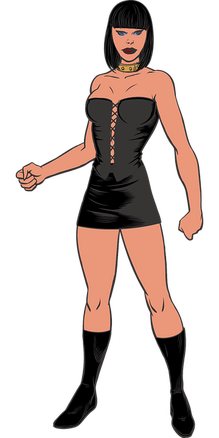 "Strong female character". For some people, it's a buzzword that indicates that a story is progressive, forward-thinking, and not sexist. For others, it's symptomatic of a problem with writing female characters that has changed shape, but certainly hasn't gone away. Personally, I like some strong female characters, and it's always nice to see the (often vastly outnumbered) women in the story holding their own. But truly good storytelling demands more, and as this excellent article by Sophia McDougall makes clear, sometimes the pursuit of the Strong Female Character actually undermines the quality of not just the story, but our expectations of female characters themselves. I especially liked her comments about the problem with some Strong Female Characters' exaggerated shows of "strength", and I definitely recommend that you click the button below and check it out!  Are you looking forward to meeting the star of one of your favorite stories? A lot of my online friends have been posting about their experiences at various sci-fi/comic cons lately, and one of them shared an article that I thought was handy and interesting. It's called 10 Questions to Ask at a Con Panel to Get Yourself Booed Out of the Hall, and I could definitely see why some of them were considered cringe-worthy! If you're going to a con anytime soon, this is a great resource to help make sure that you DO get the most out of your conversation with the panel, and DON'T end up annoying the panel or audience, or embarrassing yourself. |
AuthorStephanie is the author of My Fugitive, Voice of a Silent Fugitive, Heroic Lies, and Catgirl Roommate, as well as the artist behind the Undertale webcomic Just Cause. Categories
All
Archive
March 2024
|
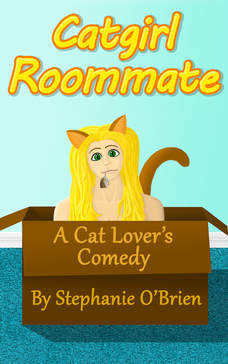

 RSS Feed
RSS Feed